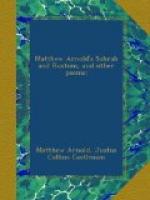=113. sconce=. Consult dictionary.
=116-122=. Why this restlessness on the part of Iseult? Why her frequent glances toward the door?
=132. dogg’d=. Worried, pursued. Coleridge uses the epithet “star-dogged moon,” l. 212, Part III, The Ancient Mariner.
=147-193=. For the poet’s purpose in introducing the remarkable word-picture of these lines, see notes on the Tyrian trader, ll. 231-250, 232, The Scholar-Gipsy.
PART III
After the death of Tristram and Iseult of Ireland, our thoughts inevitably turn to Iseult of the White Hands. The infinite pathos of her life has aroused our deepest sympathy, and we naturally want to know further concerning her and Tristram’s children.
=13. cirque=. A circle (obsolete or poetical). See l. 7, Part III.
=18. holly-trees and juniper=. Evergreen trees
common in Europe and
America.
[173]
=22. fell-fare= (or field-fare). A small thrush
found in Northern
Europe.
=26. stagshorn.= A common club-moss.
=37. old-world Breton history.= That is, the story of Merlin and Vivian, ll. 153-224, Part III.
=79-81=. Compare with the following lines from Wordsworth’s Michael:—
“This light was famous in its neighborhood. ... For, as it chanced, Their cottage on a plot of rising ground Stood single.... And from this constant light so regular And so far seen, the House itself, by all Who dwelt within the limits of the vale ... was named The Evening Star.”
=81. iron coast.= This line inevitably calls to mind a stanza from Tennyson’s Palace of Art:—
“One show’d an
iron coast and angry waves.
You seemed to hear them climb and fall
And roar, rock-thwarted, under bellowing
caves,
Beneath the windy wall.”
=92. prie-dieu.= Praying-desk. From the French prier, pray; dieu, God.
=97. seneschal.= A majordomo; a steward. Originally meant old (that is, chief) servant; from the Gothic sins, old, and salks, a servant.—SKEAT.
=134. gulls.= Deceives, tricks.
“The
vulgar, gulled into rebellion, armed,”
—DRYDEN.
=140.= posting here and there. That is, restlessly changing from place to place and from occupation to occupation.
=143-145. Like that bold Caesar=, etc. Julius Caesar (100?-44 B.C.). The incident here alluded to Is mentioned in Suetonius’ Life of the Deified Julius, Chapter VII. “Farther Spain fell to the lot of Caesar as questor. When, at the command of the Roman people, he was holding court and had come to Cadiz, he noticed in the temple of Hercules a statue of Alexander the Great. At sight of this statue he sighed, as if disgusted at his own lack of achievement, because he had done nothing of note by the time in life (Caesar was then thirty-two) that Alexander had conquered the world.” (Free translation.) [174]




